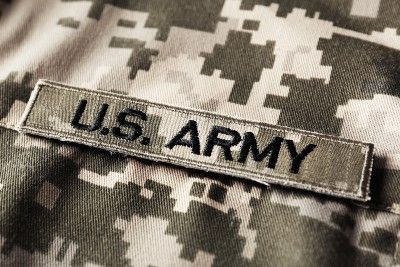Top Class Actions’s website and social media posts use affiliate links. If you make a purchase using such links, we may receive a commission, but it will not result in any additional charges to you. Please review our Affiliate Link Disclosure for more information.
This settlement is closed!
Please see what other class action settlements you might qualify to claim cash from in our Open Settlements directory!

The U.S. Army has agreed to a settlement in a class action lawsuit claiming former soldiers wrongfully received less-than-honorable discharges.
Former members of the Army, Army Reserve or Army National Guard who have served since Oct. 7, 2001, and received a less-than-honorable discharge — but not a Bad Conduct or Dishonorable discharge — while having a diagnosis or symptoms of post-traumatic stress disorder (PTSD) or a related condition and have not have not had their discharge status upgraded to Honorable are eligible to take part in this settlement.
The class action lawsuit, filed in 2017, alleged thousands of Army soldiers have been discharged with Other Than Honorable (OTH) or General (Under Honorable Conditions) (GEN) statuses because of misconduct that can be attributed to PTSD, traumatic brain injury and military sexual trauma, as well as other behavior health issues, after military operations began in Iraq and Afghanistan.
The complaint also alleged the Army Discharge Review Board (ADRB) denied status upgrades to veterans who experienced these conditions during their service and received a less-than-honorable discharge.
The Army denies the allegations but has agreed to a settlement.
According to MilitaryBenefits.info, an Honorable Discharge is the highest-level discharge a member of the military can receive and indicates the person performed their duties well, faithfully executed his or her mission and was an asset to their branch of the military.
A service member’s discharge characterization can affect their ability to access home loan, educational, retirement, Veterans Affairs (VA) and other benefits.
Under the terms of the settlement, the ADRB will automatically reconsider its decision on cases in which a less-than-honorable discharge was issued if it was issued between April 17, 2011, and the settlement’s effective date and includes a PTSD or related diagnosis. To be reconsidered, the outcome — or “grant state” — of the case must have indicated the soldier applying did not receive the full relief they requested.
Those who are eligible for automatic reconsideration will receive a notice from the Army that includes instructions for submitting further evidence and referral information for potentially free legal counsel and medical services, according to the settlement notice.
Previous ADRB applicants not eligible for automatic reconsideration and who had their cases denied or only partially granted between April 17, 2011, and Sept. 4, 2014, are eligible to reapply.
If the previous ADRB applicant was a special case or if their application was issued between Oct. 7, 2001, and April 16, 2011, and their grant state indicates they didn’t receive their full requested relief, they may apply to the ADRB again.
If the applicant was discharged more than 15 years ago, they must apply to the Army Board for Correction of Military Records (ABCMR) due to the ADRB’s 15-year statute of limitations.
All ADRB applicants will be able to request a personal hearing by phone.
In addition, as part of the settlement, the Army has agreed to include new language and procedures to its guidance governing less-than-honorable discharge applications. The Army will require detailed explanations for cases in which the upgrade to Honorable is denied.
The defendant also will train ADRB members and staff annually on applications that include a diagnosis of PTSD, traumatic brain injury or other related diagnosis or symptoms.
A fairness hearing will be held March 24, 2021, via Zoom.
The deadline for objecting to the settlement is March 3, 2021.
Who’s Eligible
Former members of the Army, Army Reserve or Army National Guard who have served since Oct. 7, 2001, and received a less-than-honorable discharge — but not a Bad Conduct or Dishonorable discharge — while having a diagnosis or symptoms of post-traumatic stress disorder (PTSD) or a related condition and have not have not had their discharge status upgraded to Honorable are eligible to take part in this settlement.
Potential Award
Reconsideration of application.
- The ADRB will automatically reconsider its decision on cases in which a less-than-honorable discharge was issued if it was issued between April 17, 2011, and the settlement’s effective date and includes a PTSD or related diagnosis. To be reconsidered, the outcome — or “grant state” — of the case must have indicated the soldier applying did not receive the full relief they requested
- If the previous ADRB applicant was a special case or if their application was issued between Oct. 7, 2001, and April 16, 2011, and their grant state indicates they didn’t receive their full requested relief, they may apply to the ADRB again.
- If the applicant was discharged more than 15 years ago, they must apply to the Army Board for Correction of Military Records (ABCMR) due to the ADRB’s 15-year statute of limitations.
Proof of Purchase
None
Claim Form
NOTE: If you do not qualify for this settlement do NOT file a claim.
Remember: you are submitting your claim under penalty of perjury. You are also harming other eligible Class Members by submitting a fraudulent claim. If you’re unsure if you qualify, please read the FAQ section of the Settlement Administrator’s website to ensure you meet all standards (Top Class Actions is not a Settlement Administrator). If you don’t qualify for this settlement, check out our database of other open class action settlements you may be eligible for.
Claim Form Deadline
No claim form is necessary; however, eligible Class Members will receive a notice from the Army that includes instructions for submitting further evidence related to their application.
The deadline to object to this settlement is March 3, 2021.
Case Name
Stephen M. Kennedy, et al. v. Ryan D. McCarthy, Case No. 3:16-cv-2010-CSH in the U.S. District Court for the District of Connecticut
Final Hearing
03/24/2021
Settlement Website
Claims Administrator
Kennedy v. McCarthy Settlement
c/o JND Legal Administration
P.O. Box 91343
Seattle, WA 98111
1-888-906-0563
info@kennedysettlement.com
Class Counsel
THE JEROME L. FRANK LEGAL SERVICES CLINIC OF YALE LAW SCHOOL
JENNER & BLOCK LLP
Defense Counsel
Natalie N. Elicker
U.S. ATTORNEY’S OFFICE FOR THE DISTRICT OF CONNECTICUT
Read About More Class Action Lawsuits & Class Action Settlements:















2 thoughts onU.S. Army Less-Than-Honorable Discharge Class Action Settlement
I would like to be added to this list. I received a general under honerable conditions and don’t receive any benefits and was diagnosed with ptsd and suffered from alcoholism at the time.
This may have made a difference for my husband, if this class action were started before 2010. My husband received an OTH discharge when he left the Army in 2007, which always seemed to have an effect on him. Unfortunately, he took his own life in 2010 and wasn’t allowed to have any Military Honors for his funeral.